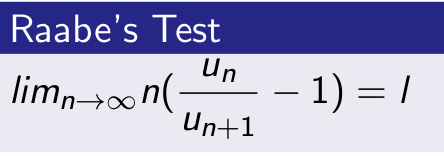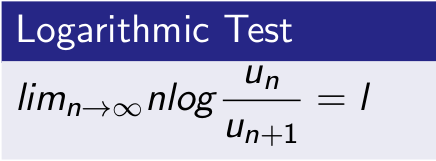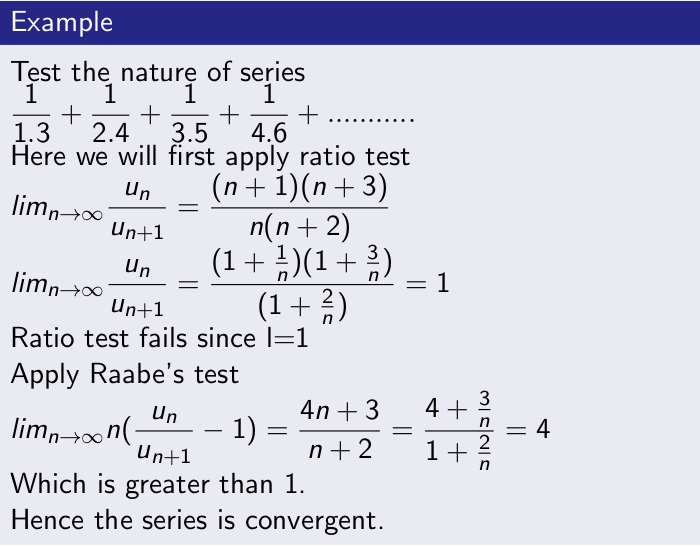To understand test for convergence of a series you have to understand sequence and series and related concepts.
Sequence
A sequence S is a function whose domain is natural numbers and range is real numbers.
i.e S: N->R. It is common practice to write a sequence S as Sn
Examples of Sequences-
Sn = <2n+1> = {3, 5, 7, 9, 11,……..}
Sn = <2n-1> = {1, 2, 5, 7, 9,……..}
Types of Sequence
Convergent Sequence-
Let Sn be a sequence, it is said to converge to a real number, if there exists a positive number \epsilon>0 and an integer m such that.
|Sn-l| < ε n>=m and n belongs to N.
Or it is written as Sn->l and read as Sn tends to l
where l is called limit of sequence Sn.
Example- Sn=<1/n> is converges to limit 0.
Divergent Sequence-
A sequence Sn is said to diverge if lim Sn-> ∞ or Sn-> -.
For example Sn= <2n + 1> diverges to +∞
Oscillatory Sequence-
A sequence Sn is said to an oscillatory sequence, if it neither converges nor diverges.
Sequence Sn= <(-1)n> neither converges nor diverges.
This sequence oscillates from -1 to +1.
Series-
A series is basically sum of elements of a sequence or more operations may involve with summation in series.
For example-
3+5+7+9+11+……………………… only summation is involved.
1+(1/2)+(1/3)+(1/4)+(1/5)+……………….. summation and division are involved.
1-(1/2)+(1/3)-(1/4)+(1/5)-(1/6)……………….. summation, subtraction and division are involved.
Test of convergence of a series.
To test weather a series converges to a limit or diverges is called test for convergence of series.
To test a series weather it converges or or diverges there or many methods are available.
If one test fails to recognize weather it converges or diverges another method you have to try.
D’ Alembert Ratio Test for Convergence –
Let ∑ un be the series of positive terms
Then

1- The series will be convergent, if l>1
2- The series will be divergent, if l<1
3- Test fails if l=1
Raabe’s Test for Convergence –
Let ∑ un be the series of positive terms
Then

1- The series will be convergent, if l>1
2- The series will be divergent, if l<1
3- Test fails if l=1
Cauchy’s Root Test
Let ∑ un be the series of positive terms
Then
1- The series will be convergent, if l<1
2- The series will be divergent, if l>1
3- Test fails if l=1
Logarithmic Test for Convergence-
Let ∑ un be the series of positive terms
Then

1- The series will be convergent, if l>1
2- The series will be divergent, if l<1
3- Test fails if l=1
De Morgan’s and Bertrand’s Test for Convergence
Let \Sum un be the series of positive terms
Then

1- The series will be convergent, if l>1
2- The series will be divergent, if l<1
3- Test fails if l=1
Second Logarithmic Ratio Test for Convergence
Let ∑ un be the series of positive terms
Then

1- The series will be convergent, if l>1
2- The series will be divergent, if l<1
3- Test fails if l=1
Gauss’s Test for Convergence
Let ∑ un be the series of positive terms
Then
where ρ and δ are positive numbers and an is bounded sequence.
Series converges if ρ >1 and diverges if ρ <=1
Conclusion-
In this post, I have explained about sequence, series and their test for convergence which is very important topic in mathematics. Hope you will understand the concepts.


